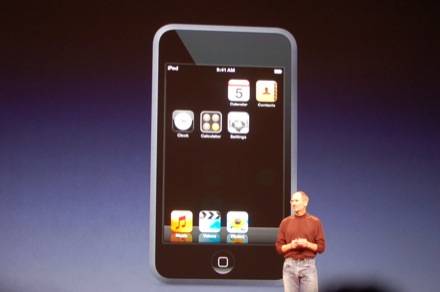When Apple released the iPhone in June there was a flurry of development from web 2.0 startups as developers worked to create iPhone-specific versions of their applications. There was some question about whether or not creating mobile sites specifically for a single handset — one which was unlikely to have more than a couple of percentage points of the world cell phone market any time soon — was a wise way to spend time and money. When I reviewed the iPhone-only social network iRovr, I remarked that the biggest question facing the startup was “whether an iPhone specific social network can gain critical mass.”

Today it seems like a lot of developers may have made the right move. At a press even this morning in San Francisco, Apple announced the iPod Touch, which is essentially an iPhone without the phone.
The iPod Touch is an 8/16GB iPod with the huge screen and multi-touch technology that made the iPhone so wowing. But what makes the Touch important for web developers is that it has built-in wifi and includes a full version of Safari. All those iPhone-optimized web sites will now work on the new breed of iPods.
Image from engadget.

The iPod is the most successful portable music player line in history, having sold 110 million devices so far, according to Apple. Even if the current version don’t fly off the shelves due to their smallish hard drive size (the regular video iPods also hit 160GB today for $50 less than than iPod Touch at 1/10th the storage size), they’re an indication of where the platform is heading. Flash memory will eventually drop in price, and the iPod Touch and iPhone will undoubtedly grow in capacity and become more attractive to iPod devotees.
What that means for web developers is a much larger user base for those iPhone-versions of their web applications. Instead of 1% of the cell phone market, they might end up eventually with access to 70-80% of the MP3 player market — or a whole bunch more people surfing those iWhatever-optimized web sites.
Conclusion
Last month a report from Forrester Research compared the iPhone and the traditional mobile web. Forrester concluded that the iPhone signaled the end of the mobile web as we know it, while Dave Winer disagreed, saying that the “iPhone view of the web is not optimal for the user.”
Richard MacManus took a more even approach, coming to the conclusion that “the iPhone isn’t quite a Mobile Web killer just yet.” The iPod Touch, however, might be another nail in the coffin of the mobile web, especially given that iPhone-optimized sites take away the ease-of-use advantage of mobile web optimized sites — and will not be more widely available because of Apple’s latest device.
What do you think? Will you be getting an iPod Touch? Does it make sense for developers to be optimizing their sites for Apple’s devices? Leave your thoughts in the comments below.
Update: Our network blog, Last100, has full and comprehensive coverage of today’s entire Apple announcement, from the new iPod Touch, to the old iPod Classic, the new Nanos, to the iPhone ringtones and the Starbucks partnership. So be sure to check it out.









